Residential Camera System Installation: Top 10 Tips
Why Home Security Matters More Than Ever in South Florida
Residential camera system installation is essential for South Florida homeowners facing rising security concerns. Here’s a quick overview:
Key Installation Options:
- Professional Installation: Includes expert placement, wiring, system optimization, and warranty support.
- DIY Installation: A cost-effective option for simple systems if you have technical knowledge.
- Hybrid Approach: Combines professional consultation with self-installation.
Essential Components:
- High-definition cameras (4K recommended)
- Network Video Recorder (NVR) or cloud storage
- Professional-grade mounting and weatherproofing
- Mobile app for remote monitoring
Rising crime rates underscore the need for robust security. For example, some areas have seen crime severity jump by as much as 15% in a single year. Protecting your family and property isn’t just smart—it’s necessary.
Modern security cameras do more than record. They deter criminals, provide evidence for law enforcement, and offer 24/7 peace of mind via remote monitoring. Many homeowners also receive 5-15% reductions in insurance premiums with monitored security systems.
Whether you’re concerned about package theft, break-ins, or simply want to monitor your property, the right camera system transforms your home into a secure sanctuary.
I’m Brad Besner, founder of TechPro Security Products. With over 15 years of experience in residential camera system installation in South Florida, my team has designed and installed hundreds of custom security solutions that prevent intrusions and help apprehend criminals.
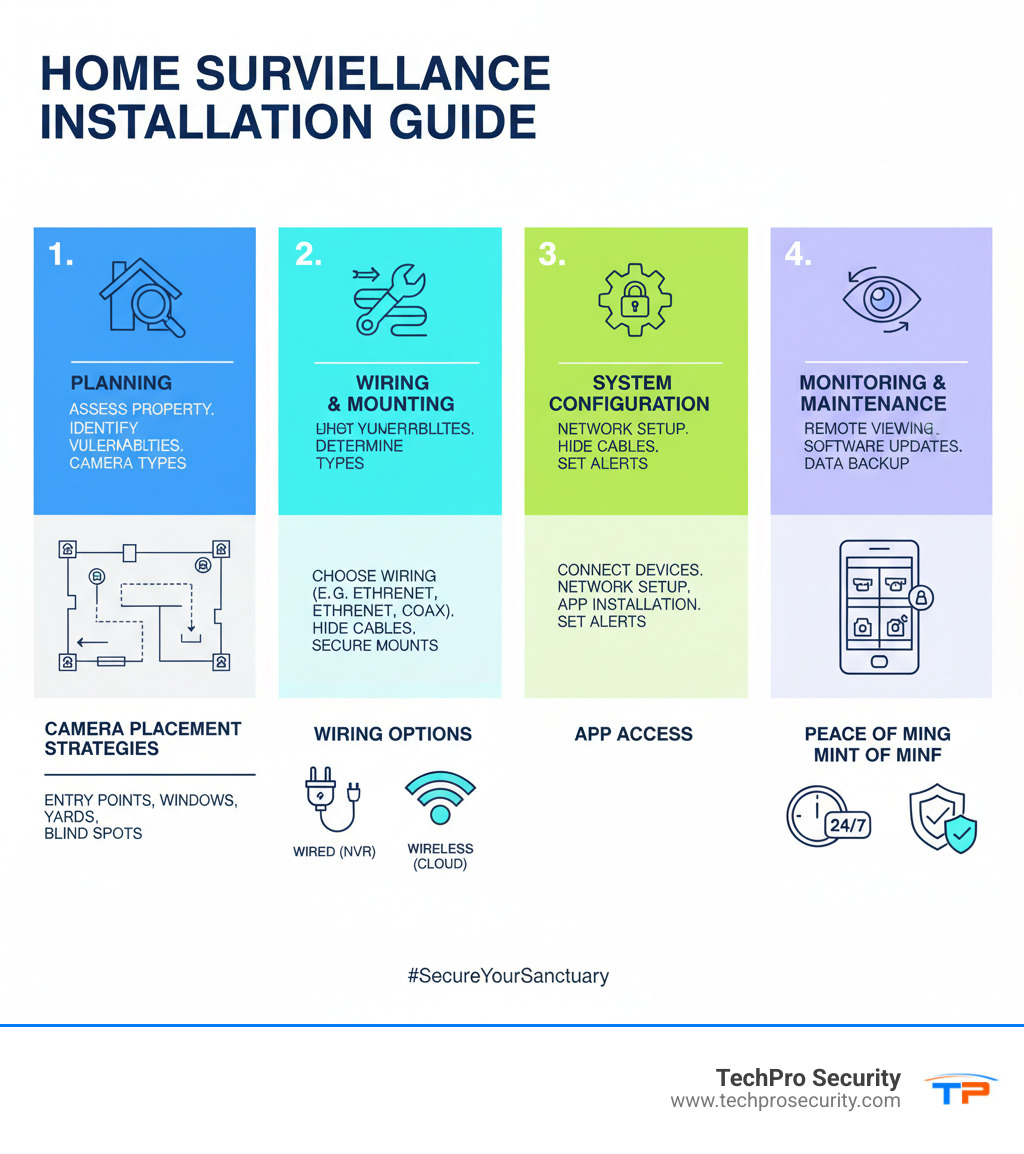
Why Invest in a Home Security Camera System?
Investing in a residential camera system installation is about more than just cameras; it’s about peace of mind and tangible protection. The benefits are clear.
Crime statistics tell a sobering story. With thousands of burglaries occurring annually, some areas see dramatic spikes in crime rates. According to Crime Severity Index research, these trends highlight a growing threat to homeowners.
Here’s how a security system helps:
-
Crime Deterrence: Visible cameras make burglars think twice. Would-be intruders often spot cameras and move to easier targets. It’s a 24/7 deterrent, a topic we explore in Do Home Security Cameras Really Prevent Crime?.
-
Evidence Collection: When a crime occurs, high-resolution footage is invaluable. It helps law enforcement identify suspects and piece together events, leading to arrests and convictions.
-
Remote Monitoring: Modern systems let you watch over your home from anywhere via your smartphone. Check on package deliveries, see when the kids get home, or just ensure everything is normal while you’re away.
-
Insurance Discounts: Many insurance companies offer 5-15% discounts on premiums for homes with monitored security systems. Check with your provider for their specific policies.
-
Increased Property Value: A professionally installed system is an attractive feature for homebuyers, signaling that a home is secure and well-maintained.
-
Package Theft Prevention: With the rise of online shopping, cameras are your best defense against porch pirates, either deterring them or capturing clear footage of any theft.
For a deeper dive, explore our guide on 10 Reasons Why You Need a Home Security System.
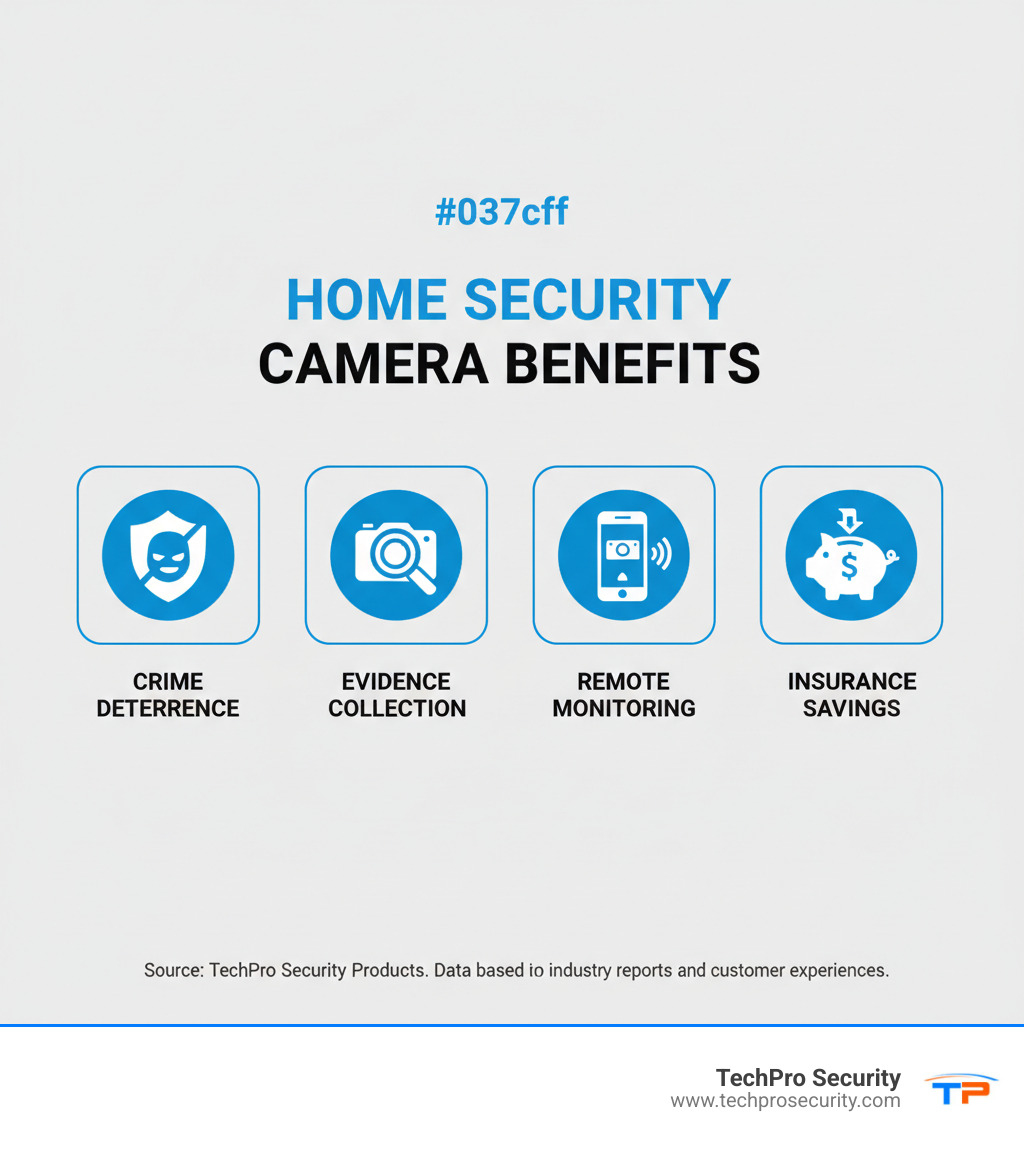
Choosing the Right System: Cameras, Features, and Storage
Selecting the right residential camera system installation requires understanding the key components. Let’s break down the options to help you make an informed choice for your South Florida home.
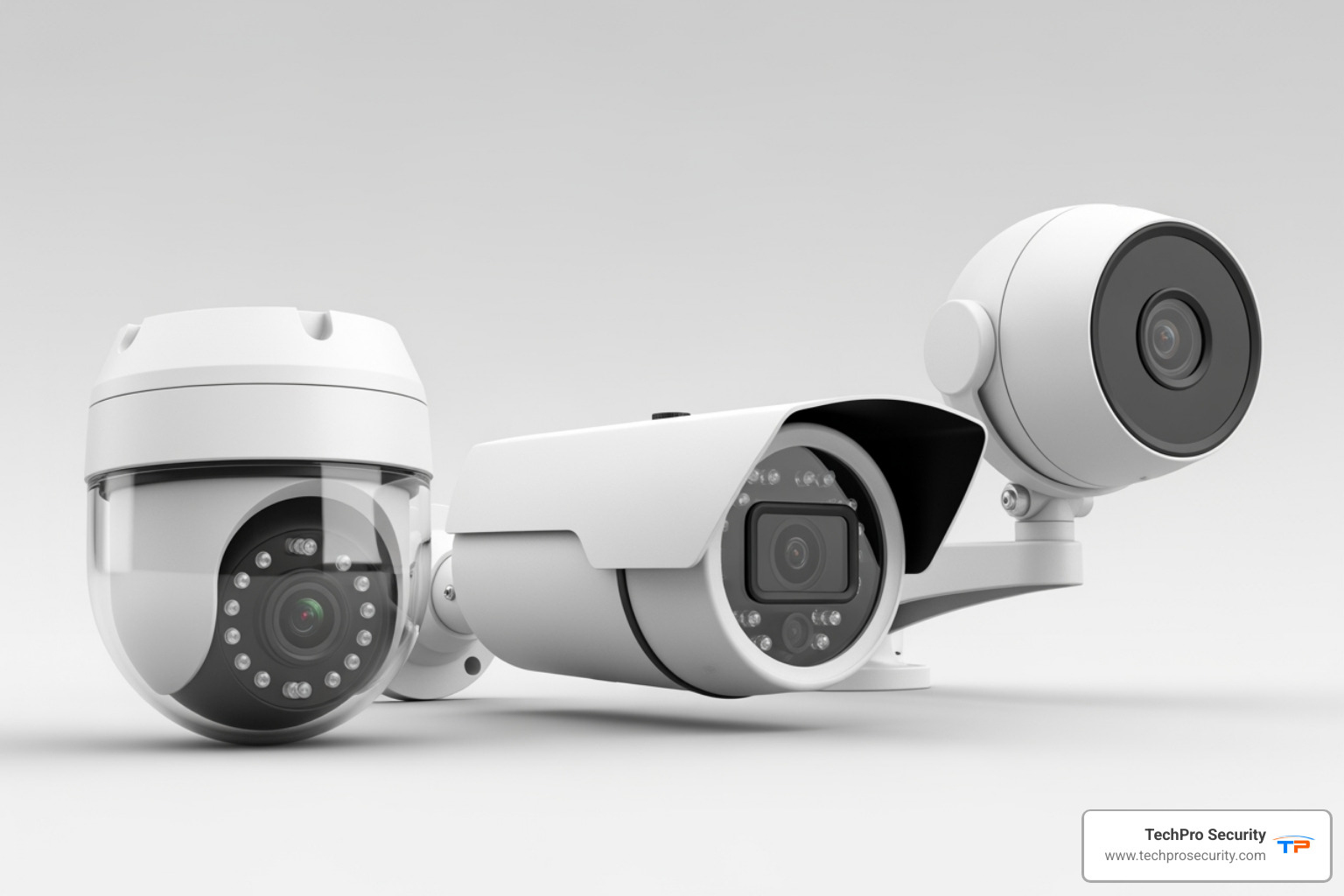
Types of Residential Security Cameras
Understanding camera types helps you match the technology to your needs.
Wired cameras use physical cables for power and data, offering best reliability and consistent video quality. They are harder to hack or interfere with, but installation is more complex.
Wireless cameras connect via Wi-Fi, simplifying installation. However, they require a power outlet and can be affected by weak Wi-Fi signals or internet outages.
IP cameras are the modern standard, transmitting high-definition digital video over a network. They offer superior resolution (up to 16MP) and advanced features like facial recognition, with encrypted data for improved security.
Analog cameras are a traditional, lower-cost option. Modern MPX analog cameras can handle HD video, but they lack the advanced capabilities and security of IP systems.
Camera design also matters. Bullet cameras are highly visible, acting as a strong deterrent. Dome cameras are more discreet and vandal-resistant. PTZ (Pan-Tilt-Zoom) cameras offer remote control to cover large areas, while Doorbell cameras secure your front entrance. For discreet surveillance, we also offer Hidden Video Camera Systems South Florida.
Key Features to Look For
Choose features that improve your system’s effectiveness.
- Resolution: 4K resolution (3840 x 2160 pixels) is highly recommended for the clarity needed to identify faces and license plates.
- Night Vision: Standard infrared provides black-and-white images in darkness, while ColorVu technology offers full-color night vision for more detailed footage.
- Field of View: Wide-angle lenses cover more area with fewer cameras.
- Weather Resistance: An IP66 or IP67 rating is crucial in South Florida to withstand sun, rain, and humidity.
- Motion Detection: Intelligent systems can differentiate between people, vehicles, and animals to reduce false alarms.
- Two-Way Audio: Allows you to communicate with visitors or deter intruders remotely.
For more on mobile integration, see our guide on Connecting Your Security Cameras to Your Smartphone.
| Feature | Wired Security Cameras | Wireless Security Cameras |
|---|---|---|
| Reliability | Highly reliable, consistent video feed | Can be affected by Wi-Fi signal strength and interference |
| Security | More secure, less prone to hacking (especially IP) | Vulnerable to hacking if network is not properly secured |
| Installation | More complex, requires drilling and running cables | Easier to install, minimal drilling |
| Power | Dedicated power source via cable (PoE or separate) | Requires power outlet or batteries (for wire-free) |
| Data Trans. | Via Ethernet (IP) or coaxial (Analog) cable | Via Wi-Fi network |
| Resolution | High resolution, maintains clarity over distance | Can be fuzzy with distance from source or weak signal |
| Cost | Generally higher upfront cost (equipment & install) | Often lower upfront, but may have cloud subscription fees |
| Best For | Large properties, critical surveillance, maximum security | Smaller areas, temporary setups, easy DIY |
Storage: Cloud vs. Local (NVR/DVR)
Your footage storage method is critical. Local storage gives you full control with no monthly fees. NVRs (Network Video Recorders) are the standard for IP systems, storing digital video on local hard drives. DVRs (Digital Video Recorders) work with analog cameras. Local storage works even if the internet is down, but equipment requires physical space.
Cloud storage uploads footage to remote servers, offering off-site backup and access from anywhere. However, it requires a reliable internet connection and involves subscription fees.
A hybrid solution, combining a local NVR with cloud backup, often provides the best of both worlds: reliability and convenient remote access.
Smart Home Integration
Integrating cameras with your smart home creates a responsive security network. This allows for:
- Centralized Control: Manage cameras via smart hubs like Samsung SmartThings or Apple HomeKit.
- Voice Commands: Use Alexa or Google Assistant to view camera feeds on compatible displays.
- Automated Routines: Create “if-then” scenarios, such as turning on smart lights when a camera detects motion. This proactive approach turns your system into an intelligent guard.
Learn more about smart pairings in our guide to the Best Security Systems to Pair With Smartphones.
The Installation Process: Professional vs. DIY Residential Camera System Installation
For your residential camera system installation, you can either do it yourself or hire a professional. The right choice depends on your technical skill, time, and the system’s complexity. A simple wireless camera might be a DIY project, but a multi-camera wired system often benefits from professional expertise.
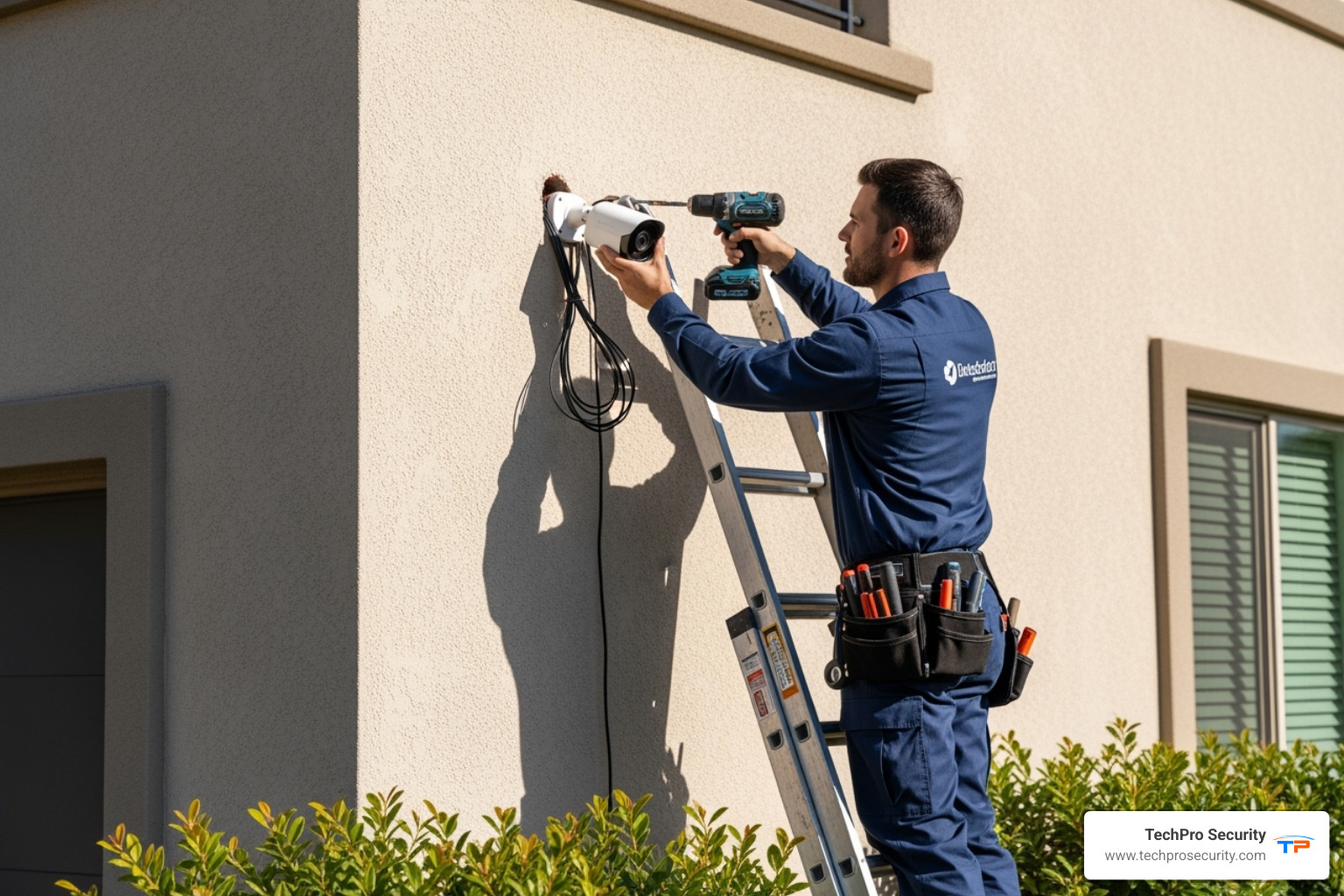
Key Factors for Your Residential Camera System Installation
Smart camera placement is crucial for an effective security system. One wrong move can leave you vulnerable. Prioritize these key areas:
- Primary Entrances: The front door is essential for capturing clear facial shots of all visitors.
- Other Entrances: Back doors and side entrances are common entry points for burglars as they are often out of street view.
- Off-Street Windows: Ground-floor windows hidden from the road are prime targets.
- Driveway and Garage: Monitor vehicles and any unauthorized activity.
- Interior Common Areas: Cover main hallways or living spaces an intruder would likely pass through. Avoid private areas like bedrooms and bathrooms.
To avoid blind spots, walk your property and identify areas where someone could approach undetected. The optimal camera height is 8-10 feet—high enough to prevent tampering but low enough to capture clear facial details.
DIY Installation: A Step-by-Step Overview
DIY residential camera system installation can be a rewarding, budget-friendly project for the handy homeowner. Here’s a general guide:
- Plan Your Layout: Sketch your home and mark camera locations to ensure full coverage.
- Gather Tools: You’ll need a drill, screwdrivers, a ladder, and safety glasses. For wired systems, you’ll also need fish tape and wire strippers.
- Mount Cameras: Mark, drill, and mount your cameras. Wired cameras require larger holes for cables.
- Run Cables (Wired Systems): This is often the biggest challenge. Run Ethernet (for IP) or Siamese (for analog) cables through walls, attics, or crawl spaces, keeping runs under 325 feet for IP cameras to maintain signal quality.
- Connect to Power: Wire-free cameras use batteries, wireless cameras need an outlet, and PoE (Power over Ethernet) cameras get power through the Ethernet cable.
- Configure Software: Install the manufacturer’s app, connect cameras to your network, and set up your recording device.
- Test the System: Check every camera feed, adjust angles, and fine-tune motion detection settings.
The Advantages of Professional Installation
While DIY is an option, professional residential camera system installation offers significant benefits that often justify the cost.
- Expert Planning: Professionals identify the best camera placements for optimal coverage, spotting vulnerabilities you might miss.
- Proper Wiring: Technicians run cables cleanly through walls and conduits for a seamless, built-in look that passes inspections.
- System Optimization: Experts fine-tune all settings—resolution, motion detection, and network connectivity—to ensure peak performance.
- Time Savings: A professional installation is typically completed in a single day, saving you a weekend of complex work.
- Warranty and Support: Our installations include warranties on equipment and workmanship, plus access to our free US-based support team.
- Avoiding Mistakes: Professionals prevent common DIY errors like poor camera angles or incorrect network configurations that can compromise your security.
For expert Home Security Camera Installation in South Florida, our team delivers the experience to ensure your system works perfectly.
Essential Considerations: Costs, Legality, and Maintenance
Before committing to a residential camera system installation, it’s important to understand the costs, legal rules, and ongoing maintenance involved. This ensures your security solution is effective, compliant, and durable.
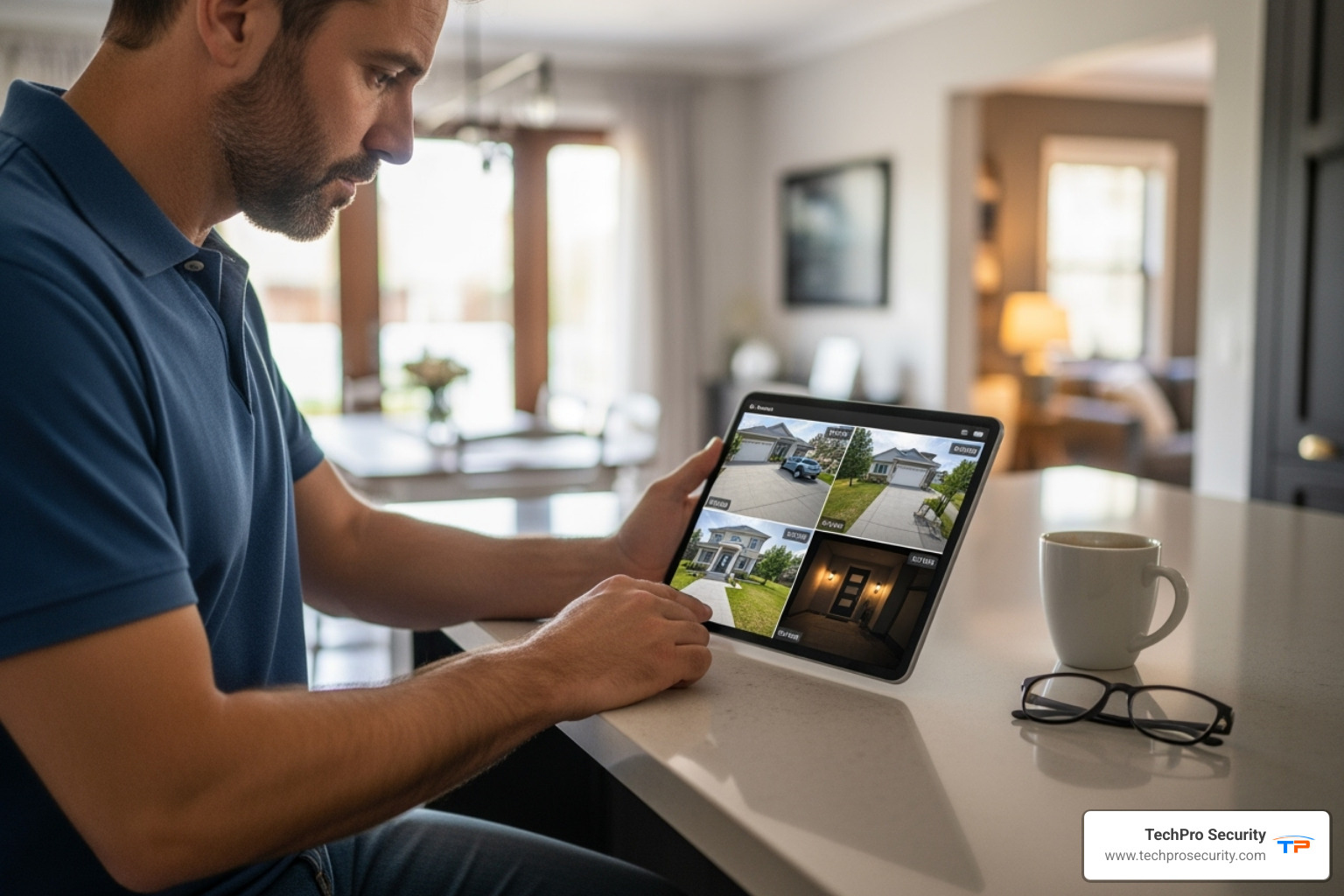
The Costs of Residential Camera System Installation
Budgeting for your system involves several components:
- Upfront Equipment Costs: Prices range from basic cameras ($25+) to high-end 4K models ($1,000+). Bundled systems with cameras, an NVR/DVR, and cables often offer the best value. IP systems generally cost more upfront but provide superior quality and features.
- Professional Installation Fees: These vary based on system complexity and the number of cameras. While an added cost, professional installation prevents costly mistakes.
- Recurring Fees: Monitored systems involve monthly fees (starting around $19.99) for 24/7 surveillance. Cloud storage also requires a subscription.
Good news: many insurance companies offer 5-15% discounts on homeowner’s premiums for monitored systems, which can offset recurring costs over time.
Legal and Privacy Considerations
Navigating the legal side of residential camera system installation is essential to avoid disputes.
- Respect Neighbor’s Privacy: This is the golden rule. Point cameras strictly at your own property. Capturing a neighbor’s yard or windows can lead to privacy invasion claims.
- Check Local Laws: Surveillance regulations vary by community in South Florida. Always check with local authorities to understand specific rules in your area.
- Audio Recording: Rules for recording audio are often stricter than for video. Many areas require consent, so understand the regulations if your cameras have microphones.
- Use Signage: Posting visible signs indicating surveillance is a good practice. It acts as a deterrent and manages privacy expectations.
- Data Protection: Secure your system, especially if it’s connected to the internet. We recommend wired IP systems with secure data handling to minimize hacking risks.
System Maintenance and Upkeep
Regular care keeps your residential camera system installation working perfectly. Follow this simple checklist:
- Clean Lenses Monthly: Dust, spider webs, and dirt can blur footage. A quick wipe with a soft cloth keeps images sharp.
- Check Connections: Periodically inspect cables and connections for wear or damage.
- Update Firmware: Regularly update software and firmware to get the latest security patches and features.
- Test Motion Detection: Walk through detection zones to ensure they are triggering correctly and adjust sensitivity as needed.
- Verify Recording: Regularly check your NVR, DVR, or cloud account to confirm the system is recording properly. There’s nothing worse than finding a failure after an incident.
Our team at TechPro Security offers ongoing support to help you maintain your system, ensuring your investment provides lasting protection.
Frequently Asked Questions about Home Camera Installation
When considering a residential camera system installation, questions are natural. Here are answers to some of the most common ones we receive.
How many security cameras do I need for my home?
The right number of cameras depends on your property’s size, layout, and specific security concerns. However, a good starting point is to cover every entry point: front door, back doors, side entrances, and vulnerable ground-floor windows.
Most average-sized homes use 4 to 8 cameras. A small condo might only need 2-4, while a large estate could require 16 or more. NVR systems are scalable (4, 8, 16, 32+ channels), allowing you to expand later. Don’t forget the driveway and garage. Inside, focus on main hallways and common areas, avoiding private spaces like bedrooms.
During a consultation, we help identify all vulnerable spots to create a comprehensive plan.
Can security cameras record 24/7?
Yes, most modern systems can record 24/7, but you have options.
-
Continuous Recording: This captures everything, ensuring no event is missed. It’s ideal for critical areas but uses significant storage space. A 1TB hard drive with a 4-camera system might store about 2 weeks of continuous footage.
-
Motion-Activated Recording: This is the more common choice. The system only records when it detects movement, saving storage space and making it easier to find important events. The same 1TB drive could store months of motion-activated clips.
Many clients use a hybrid approach: continuous recording on high-traffic cameras (like the front door) and motion detection for less active areas.
Do home security cameras work without an internet connection?
This depends on your system type, a crucial consideration in South Florida where storms can cause outages.
Wired systems with a local NVR are the most reliable. They will continue recording to the internal hard drive even if the internet goes down. You won’t have remote viewing access until service is restored, but no footage is lost.
Cloud-dependent wireless cameras typically stop recording when the internet fails, as they have nowhere to send the video data. This is a major vulnerability.
Some wireless cameras with SD card slots offer a middle ground, recording locally during an outage. However, you still lose remote access.
For maximum reliability, we recommend a hardwired IP system with local NVR storage. This ensures your residential camera system installation is always working, internet or not.
Conclusion
Your home should be a sanctuary, free from security worries. A well-planned residential camera system installation transforms your property, actively protecting what matters most.
We’ve covered the essentials: choosing the right cameras, comparing installation options, and understanding costs and legalities. Modern technology allows you to monitor your home from anywhere, providing unparalleled peace of mind.
While a simple DIY setup is feasible for some, a comprehensive security network benefits from professional expertise to ensure optimal placement, clean wiring, and seamless integration. This investment pays dividends through crime deterrence, potential insurance savings, and an invaluable sense of security.
At TechPro Security, we have over 15 years of experience in residential camera system installation across South Florida. We don’t just install equipment; we design custom security solutions custom to your home, lifestyle, and budget.
Don’t wait for an incident to take action. Protect your family and your peace of mind today.
Ready to secure your home? Contact us for your professional residential camera system installation and let our team design a custom solution for your needs.

